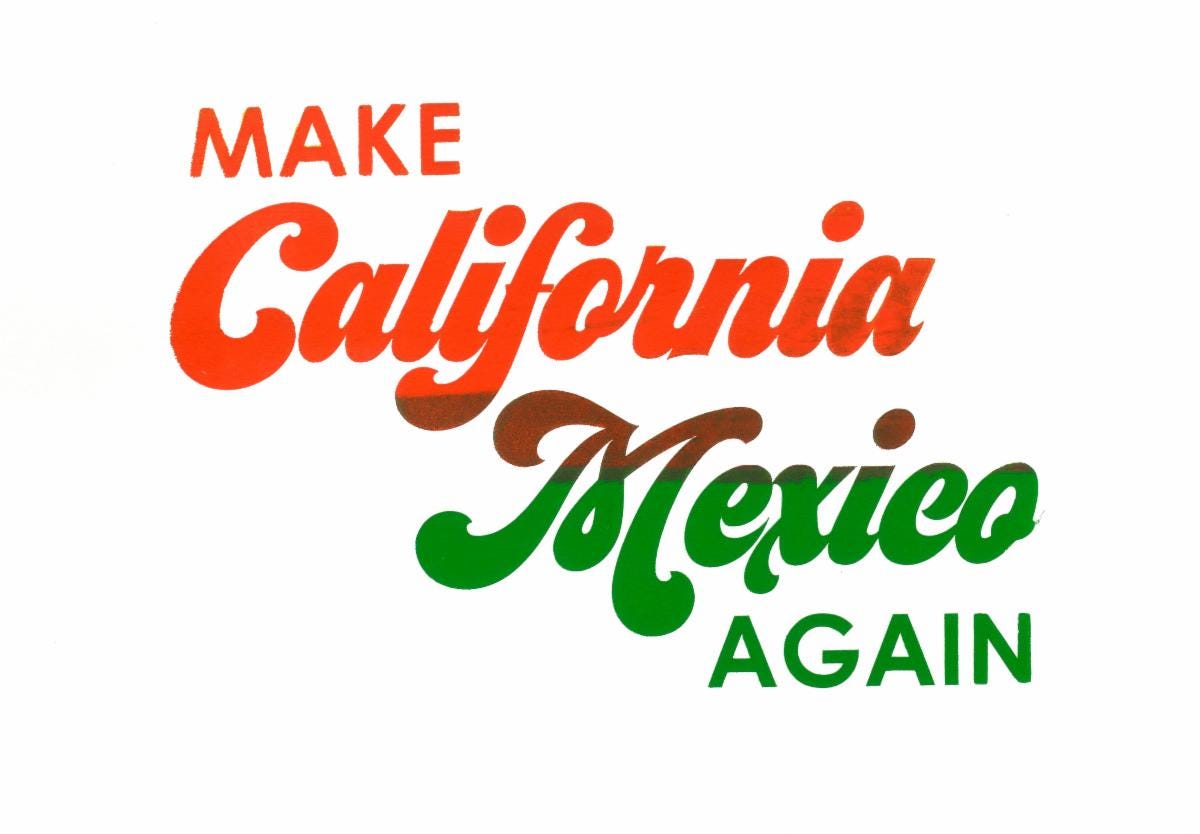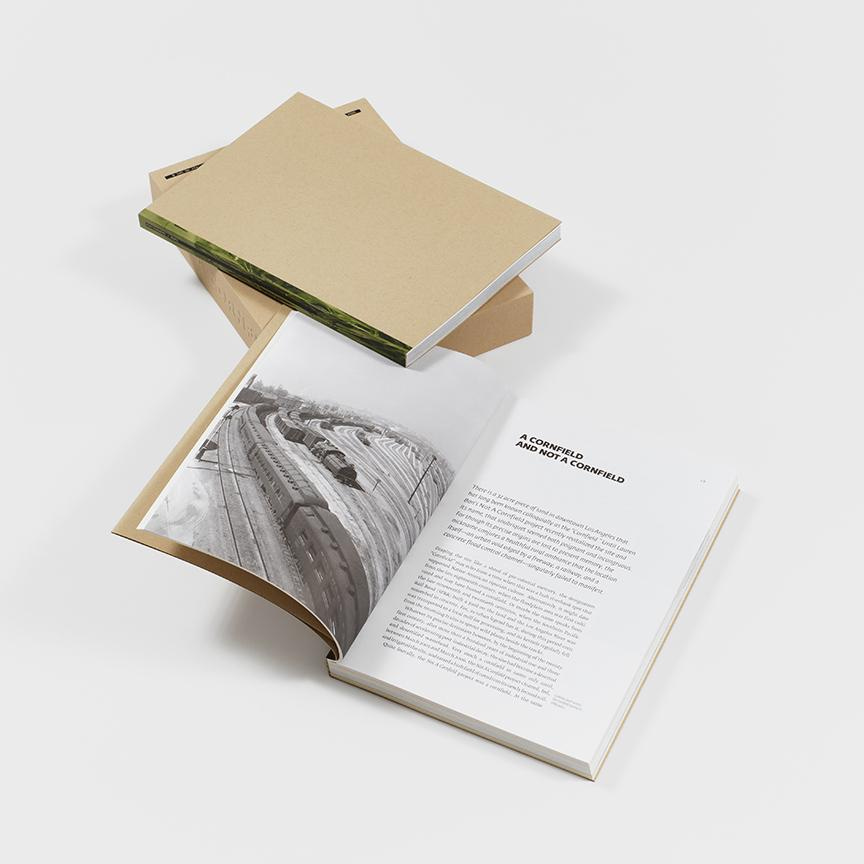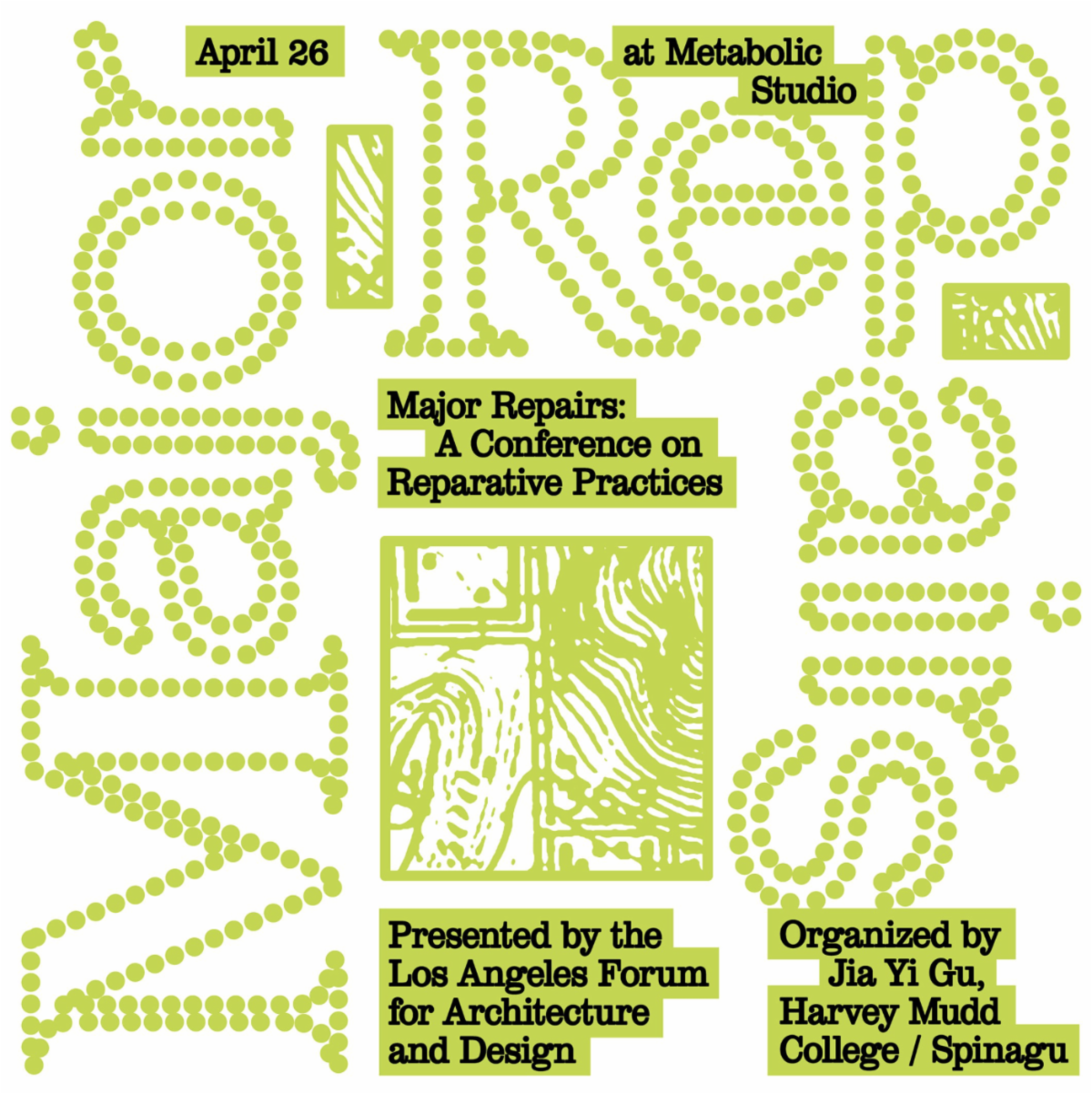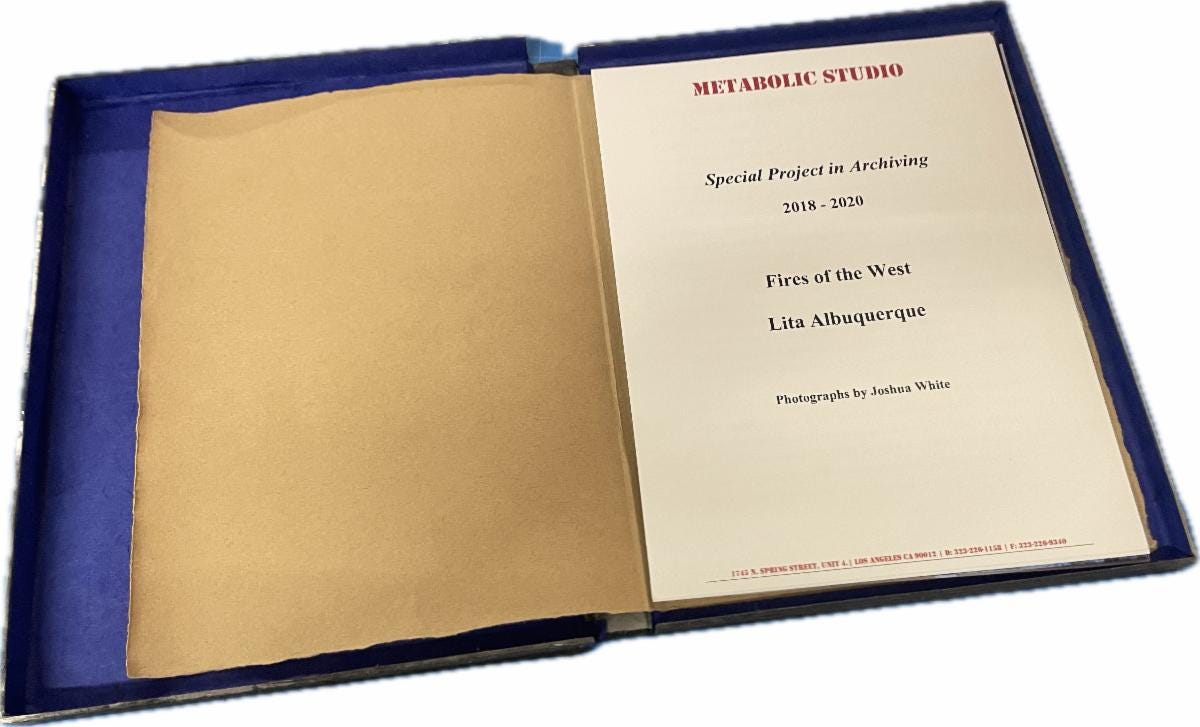Goings on at Metabolic Studio
Lauren Bon at EXPO 2025 in Osaka, Not a Cornfield: History/Site/Document in the Getty Reading Room and Metabolic Studio at the LA Art Book Fair
REIMAGINE Printmaking and Collective Action | Monday, April 7, 5:00PM–8:00PM, waitlist | Monday, May 5, 5:00PM–8:00PM, RSVP here
Join the waitlist for April’s edition of REIMAGINE, our printmaking studio and community gathering, where artists and community members come together to share space and create symbols of protest and activism to carry back out into the world. We have a collection of designs donated by various artists, to be used, adapted, and transformed, and look forward to the new contributions we receive every time we gather.
We’ll have a few wearable items available, but please bring anything specific you’re interested in printing on (or donations for other people to print on!), and drinks or snacks to share.
We just opened the list for our May 5th REIMAGINE session — spots go fast so sign up now!
What They Saw: Historical Photobooks by Women 1843–1999 | April 8–May 11, 2025 | Getty Center, Los Angeles, CA 90049
10×10 Photobooks, a non-profit organization building an international photobook community, has produced What They Saw: Historical Photobooks by Women 1843–1999, a catalogue surveying the global history of photobooks by women photographers, offering an inclusive revision and remapping of the photobook canon.
The Getty Center is hosting a pop-up reading room of the same name, gathering photobooks by women in the Getty collection, as part of an international series showcasing the 10×10 Photobooks' catalog. Complimenting that collection are notable photobooks by post-2000 Southern California women artists, including Lauren Bon’s Not a Cornfield: History/Site/Document (Essays *Timeline April 2005 May 2006*). This book commemorates Bon’s seminal Not a Cornfield project, which transformed an industrial brownfield site in Los Angeles into a vibrant cornfield for one agricultural cycle, remediating the former trainyard which is now the site of LA State Historic Park.
Future Flows, April 19 – July 6, 2025, MarinMOCA San Rafael
MarinMOCA, at the edge of the San Francisco Bay Estuary, provides the backdrop for Future Flows, a group exhibition guest-curated with Devon Bella, co-founder and director of Art + Climate Action. Lauren Bon and Metabolic Studio’s piece New Public Infrastructure (2022) anchors the exhibition, which examines the Bay as both a vital ecosystem and a key indicator of the global climate crisis.
In the gathered pieces including installations, soundscapes, social engagement and research-driven works, artists respond to the current precarity of water resources and environmental shifts impacting our world. Future Flows connects the specific histories, rights, and futures of water in the Bay Area to global concerns, highlighting the interconnectedness of water systems and their critical role in a sustainable future.
Other featured artists include: Amelia Winger-Bearskin, Amor Muñoz, Carolina Caycedo, Cheryl E. Leonard, Debra Scacco, Lordy Rodriguez, Pete Belkin, Studio for Urban Projects, and Su Yu Hsin.
EXPO 2025, Osaka, Japan, Theme Weeks Studio | Co-Creating Cultures for the Future: Creating a New Cultural Base | Panel discussion: May 5, 2025, 1:30PM - 4:00PM | Tickets here
On May 5, Lauren Bon will join Lu Yang (Tokyo-based media artist), Kylie Kwong (chef based in Sydney), Reijiro Izumi (Teamaster), Ho Tzu Nyen (contemporary artist based in Singapore) and Haegue Yang (sculptor/installation artist) on a panel moderated by Mami Kataoka, Director of the Mori Art Museum. They will be discussing “Creating a New Cultural Base” during the week themed “Co-Creating Cultures for the Future.”
The program poses exploratory questions about the meaning of newness and timelessness, from the latest technologies to the wisdom of indigenous peoples. As diverse values and cultures are attracting attention around the world, how can they coexist across regions and cultural differences? Should we find commonalities among cultures, or maintain relationships while preserving diversity? While reconsidering what “newness” means, the panelists will consider how to build new cultures where values from diverse times and regions can coexist.
For more information visit the Expo Official Website.
After the Flames: The Role of the Artist in Climate Justice and Sustainable Change | April 21, 5:00PM - 9:00PM | USC’s Arts and Climate Symposium, Bovard Auditorium | RSVP here
On the eve of Earth Day 2025, USC Arts Now and the USC Thornton School of Music will present an urgent half-day symposium and teach-in focusing on the impact of the wildfires and highlighting the pivotal role artists play in responding to crises of this magnitude, exploring the intersection of creativity, climate justice, and sustainability.
Curated by Josh Kun, USC’s Vice Provost of the Arts, and Jason King, Dean of the USC Thornton School of Music, the event will include roundtables and presentations on contemporary culture, climate justice, and sustainability. These discussions will consider the catastrophic wildfires across L.A. County, the broader climate crisis, and how artists can amplify awareness, catalyze change, and support affected communities. Speakers include Lauren Bon, Allison Agsten, Marcos Aguilar, Carolina Caycedo, Patty Chang, Paula Cizmar, Gabrielle Crowe, Patrisse Cullors, Kyle Devine, Lily Kwong, Jennifer Lott and Dawn Richard.
Major Repairs: A Conference on Reparative Practices | Saturday, April 26, 9:30AM–6:30PM | Metabolic Studio
On Saturday April 26, Lauren Bon will be a panelist at Major Repairs, presented by the Los Angeles Forum for Architecture and Design. This one-day conference addresses reparative practices, bringing together historical and reflective perspectives on the architectural responses to wildfire. Against the backdrop of an ongoing ecological emergency, Los Angeles is rebuilding— by buying into carbon-effusive material supply chains, advancing individual property development over alternative ownership models, hardening or controlling natural landscapes, and incorporating toxic manufactured materials into housing without consideration of end of life.
But how do we restore these spaces if we maintain the architectural habits that led us to disaster? Major Repairs addresses the current rebuild efforts by centering non-extractive architectural perspectives and ideas. Conference speakers and participants will elaborate on the new systems, tools, practices, codes, and habits needed to survive the ecological consequences of 20th-century modernist and postmodernist experiments. RSVP here.
Metabolic Studio will be at the LA Art Book Fair (LAABF) May 15–18!
Save the date for the LA Art Book Fair, May 15-18 at Art Center College of Design, where artists and artists’ book publishers gather to celebrate their work. The Fair will feature artists and collectives, small presses, institutions, galleries, antiquarian booksellers and distributors, as well as a full calendar of book launches, discussions, performances, and special projects that highlight interdisciplinary artists’ publishing practices.
Metabolic Studio will be presenting new collections and zines at LAABF — we’ll see you there!
Germinating Meandros: A Tour and Teach-In
Meandros is an evolving initiative that reimagines the urban watershed through public art and ecological repair, transforming urban spaces into dynamic, regenerative landscapes. We are unpaving parking spots and in their place, installing columns of living landslide soil filled with native seeds, reclaiming lost water pathways, forming new pollination corridors, and regenerating the land beneath our feet.
In March, we held our first Meandros teach-in, bringing together community organizations to be part of this living project, sharing ideas and resources on how to drive broader policy change and strengthen our city’s resilience against future ecological catastrophes—so landslide soils and rainwater will move and function like a river once more.
Join us on Discord to talk about how we're building the Meandros community and turning ideas into action.
Fault Line Radio: Remembering with the Land with Kathy Jefferson Bancroft
In this episode of Fault Line Radio, Lauren Bon talks to Kathy Jefferson Bancroft, a member of the Lone Pine Paiute-Shoshone Tribe in Payahuunadu, also known as Owens Valley. Kathy is the Tribal Historic Preservation Officer, holding the stories of her people not just in memory, but in practice.
Owens Lake is mostly gone, water moved south by the Los Angeles Aqueduct, leaving a dry lake bed in its wake. The Aqueduct, engineered to sustain a metropolis, came at the cost of the Paiute way of life and as the water drained from Owens Lake, it became one of the country’s worst sources of dust pollution.
Kathy, however, says that the lake is not dead—it is dreaming. She calls it a “library of ancestors,” and her work is to help others see that even in desiccation, the land remains sacred. She helped lead the effort to nominate over 186 square miles of the lakebed to the National Register of Historic Places, not as a relic, but as a living archive. She wants people to understand that sacredness is not just in temples or churches—it is in lake beds, in the paths of water, in the bones of mountains.
“Indigenous TEK for a Climate Resilient LA: Realigning Planetary Metabolisms Through Coalition Building” by LinLee Yuan in Mold Magazine.
For Mold Magazine’s article “Indigenous TEK for a Climate Resilient LA: Realigning Planetary Metabolisms Through Coalition Building” LinLee Yuan had in-depth conversations with Lauren Bon, Gabrielle Crowe (Vice Chair and Secretary of Environmental Sciences, Gabrielino-Shoshone Nation), Marcos Aguilar (Executive Director, Anawakalmekak), and Patrisse Cullors (The Center for Art and Abolition, Crenshaw Dairy Mart, Black Lives Matter). They talked about the call for an Indigenous-led recovery strategy that upholds traditional knowledge of the land, water and its capacity, and charting a path honoring the safety net of mutual aid and hyperlocal community while seeding a different future for the entire city of Los Angeles.
This piece is a part of Mold’s series Metabolic Systems, which looks into the cycles that underpin our cultures of consumption, from decay to digestion. Read the full article here.













